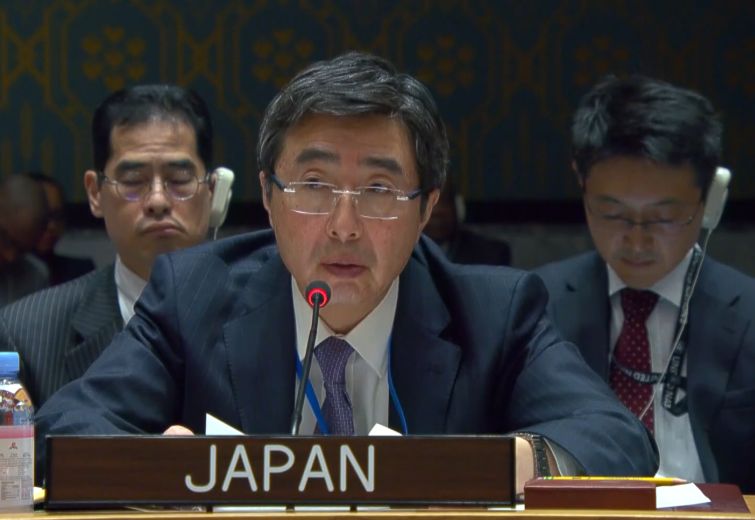大湖地域情勢に関する安保理会合における石兼大使ステートメント
令和5年4月19日

(As delivered)
Thank you, Mr. President.
I would like to express my gratitude to Special Envoy Xia for his briefing and PBC Chair Simonovic for the advice. I also welcome the participation of representatives from regional states.
The recurrent violence by armed groups, aggravating human security crises, and the increasing tensions between the DRC and Rwanda are of serious concern. This grave situation continues to prevent the region from harnessing its enormous potential, which the population has long deserved. Our efforts must come together to guarantee the integrity and sovereignty of the Democratic Republic of Congo (DRC). The signatory countries to the Peace, Security and Cooperation Framework for the DRC and the Region, together with its guarantors, must renew their commitment, at national, regional and international level, to its full implementation.
As was highlighted by the PBC Chair, the ongoing regional peace initiatives, including the Nairobi process and the Luanda process, have a vital role to play. An immediate cessation of hostilities is the very first step to achieving the common goal of sustainable peace. All armed groups must fully engage in those processes, and any attempts to support armed groups incompatible with the regional initiatives cannot be tolerated. Military and non-military measures should be well coordinated in a synergetic manner aligned with MONUSCO’s ongoing efforts.
The international assistance must continue to focus on creating a conducive environment for successful regional initiatives and cooperation. Confidence-building measures and constructive dialogues need to expand further among stakeholders. It is also imperative to ensure uninterrupted support to address the extreme humanitarian situations, which are affecting women and children most, and exacerbated by armed forces. We expect the Special Envoy Xia and his office to continue to help advancing Women/ Youth, Peace, and Security in the region.
The complexity of the challenges the region faces requires us to take a comprehensive, cross-border approach based on the Humanitarian-Development-Peace nexus. The UN Strategy for Peace Consolidation, Conflict Prevention, and Conflict Resolution in the Great Lakes Region rightly reflects this in its flagship initiatives.
One of the main pillars of the Strategy involves action to prevent the illegal exploitation of natural resources, which remains one of the drivers of conflict. Enhanced border-control and judicial cooperation are essential to effectively address this long-standing challenge, and UN entities should further assist in these efforts. The PBF is well-suited to help cross-border projects and should play a catalytic role to promote further regional initiatives.
Mr. President,
Our bilateral support should also be a well-integrated component of larger international efforts, and should complement and amplify the effects of regional initiatives. With this in mind, Japan, in partnership with UN agencies, funds and programmes, has been working to help improve lives and wellbeing of people. It includes supporting the strengthening of social resilience; helping disarmament, demobilization, and reintegration; and providing emergency humanitarian assistance to IDPs and refugees.
Japan continues to be fully engaged with all partners including MONUSCO for a peaceful and prosperous Great Lakes region.
I thank you.
I would like to express my gratitude to Special Envoy Xia for his briefing and PBC Chair Simonovic for the advice. I also welcome the participation of representatives from regional states.
The recurrent violence by armed groups, aggravating human security crises, and the increasing tensions between the DRC and Rwanda are of serious concern. This grave situation continues to prevent the region from harnessing its enormous potential, which the population has long deserved. Our efforts must come together to guarantee the integrity and sovereignty of the Democratic Republic of Congo (DRC). The signatory countries to the Peace, Security and Cooperation Framework for the DRC and the Region, together with its guarantors, must renew their commitment, at national, regional and international level, to its full implementation.
As was highlighted by the PBC Chair, the ongoing regional peace initiatives, including the Nairobi process and the Luanda process, have a vital role to play. An immediate cessation of hostilities is the very first step to achieving the common goal of sustainable peace. All armed groups must fully engage in those processes, and any attempts to support armed groups incompatible with the regional initiatives cannot be tolerated. Military and non-military measures should be well coordinated in a synergetic manner aligned with MONUSCO’s ongoing efforts.
The international assistance must continue to focus on creating a conducive environment for successful regional initiatives and cooperation. Confidence-building measures and constructive dialogues need to expand further among stakeholders. It is also imperative to ensure uninterrupted support to address the extreme humanitarian situations, which are affecting women and children most, and exacerbated by armed forces. We expect the Special Envoy Xia and his office to continue to help advancing Women/ Youth, Peace, and Security in the region.
The complexity of the challenges the region faces requires us to take a comprehensive, cross-border approach based on the Humanitarian-Development-Peace nexus. The UN Strategy for Peace Consolidation, Conflict Prevention, and Conflict Resolution in the Great Lakes Region rightly reflects this in its flagship initiatives.
One of the main pillars of the Strategy involves action to prevent the illegal exploitation of natural resources, which remains one of the drivers of conflict. Enhanced border-control and judicial cooperation are essential to effectively address this long-standing challenge, and UN entities should further assist in these efforts. The PBF is well-suited to help cross-border projects and should play a catalytic role to promote further regional initiatives.
Mr. President,
Our bilateral support should also be a well-integrated component of larger international efforts, and should complement and amplify the effects of regional initiatives. With this in mind, Japan, in partnership with UN agencies, funds and programmes, has been working to help improve lives and wellbeing of people. It includes supporting the strengthening of social resilience; helping disarmament, demobilization, and reintegration; and providing emergency humanitarian assistance to IDPs and refugees.
Japan continues to be fully engaged with all partners including MONUSCO for a peaceful and prosperous Great Lakes region.
I thank you.
